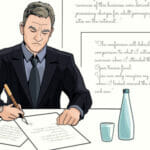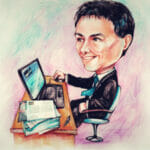The Best Books I Read in 2015 By Bill Gates, Gates Notes
I just looked over the list of books I read this year, and I noticed a pattern. A lot of them touch on a theme that I would call “how things work.” Some explain something about the physical world, like how steel and glass are used, or what it takes to get rid of deadly diseases. Others offer deep insights into human beings: our strengths and flaws, our capacity for lifelong growth, or the things we value. I didn’t set out to explore these themes intentionally, though in retrospect it make a lot of sense since the main reason I read is to learn.
Below the video are short reviews of some of the best books I read in 2015, in no particular order, with links to longer write-ups. As usual with my year-end lists (see 2013 and 2014), not all the books came out this year. I hope you find something to your liking. And feel free to share your own favorites in the comments section below.
Best Books Bill Gates Read In 2015 – The Road to Character, by David Brooks.
[drizzle]With the wisdom, humor, curiosity, and sharp insights that have brought millions of readers to his New York Times column and his previous bestsellers, David Brooks has consistently illuminated our daily lives in surprising and original ways. In The Social Animal, he explored the neuroscience of human connection and how we can flourish together. Now, in The Road to Character, he focuses on the deeper values that should inform our lives. Responding to what he calls the culture of the Big Me, which emphasizes external success, Brooks challenges us, and himself, to rebalance the scales between our “résumé virtues”—achieving wealth, fame, and status—and our “eulogy virtues,” those that exist at the core of our being: kindness, bravery, honesty, or faithfulness, focusing on what kind of relationships we have formed.
Looking to some of the world’s greatest thinkers and inspiring leaders, Brooks explores how, through internal struggle and a sense of their own limitations, they have built a strong inner character. Labor activist Frances Perkins understood the need to suppress parts of herself so that she could be an instrument in a larger cause. Dwight Eisenhower organized his life not around impulsive self-expression but considered self-restraint. Dorothy Day, a devout Catholic convert and champion of the poor, learned as a young woman the vocabulary of simplicity and surrender. Civil rights pioneers A. Philip Randolph and Bayard Rustin learned reticence and the logic of self-discipline, the need to distrust oneself even while waging a noble crusade.
Blending psychology, politics, spirituality, and confessional, The Road to Character provides an opportunity for us to rethink our priorities, and strive to build rich inner lives marked by humility and moral depth.
“Joy,” David Brooks writes, “is a byproduct experienced by people who are aiming for something else. But it comes.”
Best Books Bill Gates Read In 2015 – Thing Explainer: Complicated Stuff in Simple Words, by Randall Munroe.
Have you ever tried to learn more about some incredible thing, only to be frustrated by incomprehensible jargon? Randall Munroe is here to help. In Thing Explainer, he uses line drawings and only the thousand (or, rather, “ten hundred”) most common words to provide simple explanations for some of the most interesting stuff there is, including:
- food-heating radio boxes (microwaves)
- tall roads (bridges)
- computer buildings (datacenters)
- the shared space house (the International Space Station)
- the other worlds around the sun (the solar system)
- the big flat rocks we live on (tectonic plates)
- the pieces everything is made of (the periodic table)
- planes with turning wings (helicopters)
- boxes that make clothes smell better (washers and dryers)
- the bags of stuff inside you (cells)
How do these things work? Where do they come from? What would life be like without them? And what would happen if we opened them up, heated them up, cooled them down, pointed them in a different direction, or pressed this button? In Thing Explainer, Munroe gives us the answers to these questions and so many more. Funny, interesting, and always understandable, this book is for anyone—age 5 to 105—who has ever wondered how things work, and why.
Best Books Bill Gates Read In 2015 – Being Nixon: A Man Divided, by Evan Thomas.
Evan Thomas delivers the best single-volume biography of Richard Nixon to date, a radical, unique portrait of a complicated figure who was both determinedly optimistic and tragically flawed. The New York Times bestselling author of Ike’s Bluff and Sea of Thunder, Thomas brings new life to one of American history’s most infamous, paradoxical, and enigmatic politicians, dispensing with myths to achieve an intimate and evenhanded look at the actual man.
What drove a painfully shy outcast in elite Washington society—a man so self-conscious he refused to make eye contact during meetings—to pursue power and public office? How did a president so attuned to the American political id that he won reelection in a historic landslide lack the self-awareness to recognize the gaping character flaws that would drive him from office and forever taint his legacy?
In Being Nixon, Evan Thomas peels away the layers of the complex, confounding figure who became America’s thirty-seventh president. The son of devout Quakers, Richard Nixon (not unlike his rival John F. Kennedy) grew up in the shadow of an older, favored brother and thrived on conflict and opposition. Through high school and college, in the navy and in politics, he was constantly leading crusades and fighting off enemies real and imagined. As maudlin as he was Machiavellian, Nixon possessed the plainspoken eloquence to reduce American television audiences to tears with his career-saving “Checkers” speech; meanwhile, his darker half hatched schemes designed to take down his political foes, earning him the notorious nickname “Tricky Dick.”
Drawing on a wide range of historical accounts, Thomas reveals the contradictions of a leader whose vision and foresight led him to achieve détente with the Soviet Union and reestablish relations with communist China, but whose underhanded political tactics tainted his reputation long before the Watergate scandal. One of the principal architects of the modern Republican Party and its “silent majority” of disaffected whites and conservative ex-Dixiecrats, Nixon was also deemed a liberal in some quarters for his efforts to desegregate Southern schools, create the Environmental Protection Agency, and end the draft.
A deeply insightful character study as well as a brilliant political biography, Being Nixon offers a surprising look at a man capable of great bravery and extraordinary deviousness—a balanced portrait of a president too often reduced to caricature.
Best Books Bill Gates Read In 2015 – Sustainable Materials With Both Eyes Open, by Julian M. Allwood, Jonathan M. Cullen, et al.
This evidence-based survey presents a holistic vision of options for a sustainable future by going beyond efficient and clean production to the inclusion of material efficiency and the reduction of demand. Beginning with an all-encompassing examination of the uses of the five most important materials—steel, aluminum, cement, plastic, and paper—this exploration delves into the entire lifecycle of these materials, from smelting and goods manufacture to final recycling. Through evidence drawn from this analysis and real-world commercial enterprises, the study submits creative solutions for achieving manufacturing efficiencies and the same functionality or services using less material, and identifies potential economic outcomes from these scenarios.
Best Books Bill Gates Read In 2015 – Eradication: Ridding the World of Diseases Forever?, by Nancy Leys Stepan.
How shall we improve human health? One answer is: by eradication. The Gates Foundation announced in 2007 that their goal is malaria eradication; another of their priorities is polio eradication. Eradication means the complete elimination of a disease through deliberate human intervention. It stands for an absolute in public health.
This book by the award-winning historian of medicine Nancy Leys Stepan is an accessible, beautifully written, and deeply researched examination of one of the most controversial issues in public health today. The eradication of disease might seem like an absolute good. But critics of eradication argue that the huge resources needed to achieve eradication could be better allocated toward developing primary health services and general improvement in health.
This book aims to look at the benefits and drawbacks of single-minded efforts to rid the world of particular diseases, one at a time. The sweep of the book is impressive, from the origins of the idea of complete eradication in the early twentieth century until the present-day campaigns against polio, Guinea worm disease, and now malaria. The author places eradication’s story in its many contexts, from imperialism, changing notions of public health, the history of medicine and its technologies, the development of international health agencies such as the World Health Organization, and the impact of the Cold War on the shift of attention to disease in developing countries.
At the center of this narrative is Dr. Fred Lowe Soper (1893-1977), a U.S.-trained doctor who became the arch-eradicationist of his time. His campaigns to eradicate hookworm disease, yaws, yellow fever, malaria, and smallpox are treated in compelling detail, as are the roles of international health agencies such as the Rockefeller Foundation and the World Health Organization.
Throughout the book Stepan draws attention to the way that the ideal of eradication has repeatedly arisen, phoenix-like, from its setbacks. In a powerful conclusion, she uses the example of the current campaign to eradicate Guinea worm disease to argue that, today, under the right circumstances, eradication and primary health care need not be in conflict, as they were in the past, but can form mutually reinforcing policies to improve the health and well-being of populations, especially the poorest and most disease-burdened populations of the world.
Best Books Bill Gates Read In 2015 – Mindset: The New Psychology of Success, by Carol S. Dweck.
Dweck explains why it’s not just our abilities and talent that bring us success—but whether we approach them with a fixed or growth mindset. She makes clear why praising intelligence and ability doesn’t foster self-esteem and lead to accomplishment, but may actually jeopardize success. With the right mindset, we can motivate our kids and help them to raise their grades, as well as reach our own goals—personal and professional. Dweck reveals what all great parents, teachers, CEOs, and athletes already know: how a simple idea about the brain can create a love of learning and a resilience that is the basis of great accomplishment in every area.
Honorable mention: I read one book this year that definitely deserves a spot on this list, but I haven’t had time to give it the full write-up it deserves. The Vital Question, by Nick Lane, is an amazing inquiry into the origins of life. I loved it so much that I immediately bought all of Lane’s other books. And I jumped at the chance to meet Lane and talk to him about his research last September, when both of us were in New York City. I’ll post more about his fascinating work when I get the chance.
[/drizzle]










